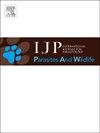Rodent malaria parasites detected in the invasive Rattus rattus in Gabon
IF 2
3区 医学
Q3 ECOLOGY
International Journal for Parasitology-Parasites and Wildlife
Pub Date : 2025-07-05
DOI:10.1016/j.ijppaw.2025.101112
引用次数: 0
Abstract
Invasive species are increasingly recognized for their role in reshaping host–parasite dynamics. This study reports the first molecular detection of Plasmodium yoelii in the invasive black rat (Rattus rattus) in Gabon, based on a systematic molecular screening of 527 rodents captured in rural villages between 2021 and 2022. Two R. rattus individuals tested positive for P. yoelii, with phylogenetic analysis confirming identity with strains previously isolated from native rodents in the region. These findings challenge the traditional view that rodent malaria parasites are restricted to native hosts and highlight R. rattus as a potential, albeit likely incidental, host within local Plasmodium transmission networks. Despite a low infection prevalence (0.38 %), this result raises important questions about the capacity of invasive rodents to integrate into local parasite cycles and influence disease dynamics.

加蓬入侵鼠中检出鼠类疟疾寄生虫
入侵物种在重塑宿主-寄生虫动态方面的作用日益得到认可。本研究报告了基于对2021年至2022年在加蓬农村捕获的527只啮齿动物的系统分子筛选,首次在入侵黑鼠(Rattus Rattus)中检测到约利疟原虫。2只家鼠对约氏疟原虫检测呈阳性,系统发育分析证实与以前从该地区本地啮齿动物中分离的菌株相同。这些发现挑战了啮齿动物疟原虫局限于本地宿主的传统观点,并强调了大鼠在当地疟原虫传播网络中是一个潜在的宿主,尽管可能是偶然的。尽管感染率很低(0.38%),但这一结果提出了关于入侵啮齿动物融入当地寄生虫周期并影响疾病动态的能力的重要问题。
本文章由计算机程序翻译,如有差异,请以英文原文为准。
求助全文
约1分钟内获得全文
求助全文
来源期刊

International Journal for Parasitology-Parasites and Wildlife
Medicine-Infectious Diseases
CiteScore
3.80
自引率
5.60%
发文量
113
审稿时长
45 days
期刊介绍:
The International Journal for Parasitology: Parasites and Wildlife (IJP-PAW) publishes the results of original research on parasites of all wildlife, invertebrate and vertebrate. This includes free-ranging, wild populations, as well as captive wildlife, semi-domesticated species (e.g. reindeer) and farmed populations of recently domesticated or wild-captured species (e.g. cultured fishes). Articles on all aspects of wildlife parasitology are welcomed including taxonomy, biodiversity and distribution, ecology and epidemiology, population biology and host-parasite relationships. The impact of parasites on the health and conservation of wildlife is seen as an important area covered by the journal especially the potential role of environmental factors, for example climate. Also important to the journal is ''one health'' and the nature of interactions between wildlife, people and domestic animals, including disease emergence and zoonoses.
 求助内容:
求助内容: 应助结果提醒方式:
应助结果提醒方式:


